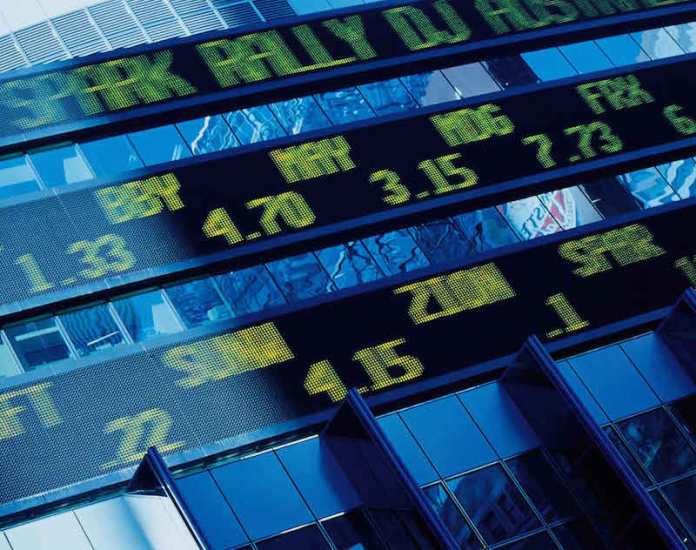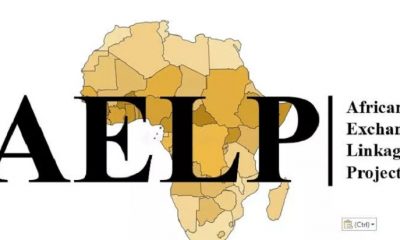Economy
Seven African Capital Markets Begin Cross-border Trading

By Aduragbemi Omiyale
Last Friday, the African Exchanges Linkage Project (AELP) successfully integrated seven African capital markets by facilitating cross-border trading and free movement of investments in the continent through the AELP Link platform.
The go-live happened when the platform was officially switched on at 0000 UTC, allowing the trading of exchange-listed securities across the participating securities exchanges.
The AELP, a flagship project of the African Securities Exchanges Association (ASEA) and the African Development Bank (AfDB), is aimed at facilitating cross-border trading among seven participating Exchanges and select broker firms.
The seven exchanges participating in Phase 1 of the AELP are Bourse Regionale des Valeurs Mobilieres (BRVM), Bourse de Casablanca, The Egyptian Exchange (EGX), Johannesburg Stock Exchange (JSE), Nairobi Securities Exchange (NSE), Nigerian Exchange Limited (NGX), and Stock Exchange of Mauritius (SEM).
In July 2021, ASEA signed a contract with DirectFN Ltd for the design and implementation of the AELP Link trading system in the seven markets.
The link, which is hosted on the Oracle Cloud Infrastructure (OCI), has been designed to integrate with exchange and broker trading systems and is available in English, French and Arabic.
It aggregates live market data from the Exchanges and enables brokers to access information and see the market depth and liquidity of the foreign market of interest.
In the project’s first phase, 33 stockbrokers have connected as at go-live based on agreed criteria and expression of interest by approved licensed dealing members from each of the participating exchanges.
They have already embarked on signing counterparty broker agreements between different markets. The sponsoring stockbrokers enable access to their domestic markets to sponsored stockbrokers from other markets and vice versa.
The sponsoring broker will clear and settle trades in the host market using their local currency in compliance with the host market’s rules and practices. The regulatory bodies in all the participating markets are therefore apprised of the progress. Participating trading license holders from Nigeria are FBNQuest Securities Limited; Stanbic IBTC Stockbrokers Limited; Chapel Hill Denham; Cardinal Stone Securities Ltd; Cordros Securities Limited; and RMB Stockbrokers.
Commenting on the go-live, the ASEA President, Dr Edoh Kossi Amenounve, said, “The go-live today of the AELP Link is a great milestone towards achieving ASEA’s mission to engage African capital market ecosystems in order to foster capital mobilization, promote sustainability, and enhance financial inclusion for the benefit of Africa’s economic development.
“Trading infrastructure harmonization through the Link is expected to ease existing trading processes and potentially reduce the cost of trading across African capital markets.
“I, therefore, congratulate all the participating exchanges and the respective brokers for being front-runners in this great pan-African integration initiative.”
Speaking on the successful live integration of the AELP, the CEO of NGX Limited, Mr Temi Popoola, lauded the efforts of stakeholders in the actualisation of the project.
“The AELP Link is a testament to the will of African capital market participants, particularly exchanges to effectively collaborate and drive cross-border trading and capital formation.
“It will significantly facilitate capital flows between African countries and further move us closer to the accomplishment of the goals of the African Continental Free Trade Area Agreement via the fusion of our respective financial markets.”
The ASSDA Organising Secretary, Mr Willie Njoroge, observed that “this is a historic moment for Africa, to finally actualize the linking of stock exchanges across Africa after many unsuccessful attempts over the last 2 decades.”
Business Post learned that the AELP test environment has been operational since July 2022, enabling the stockbrokers and securities dealers to familiarize themselves with the platform and execute mock trades. This culminated in the completion of the User Acceptance Testing on November 7, paving the way for the technical go-live on November 18.
Economy
Tinubu Okays Extension of Ban on Raw Shea Nut Export by One Year

By Aduragbemi Omiyale
The ban on the export of raw shea nuts from Nigeria has been extended by one year by President Bola Tinubu.
A statement from the Special Adviser to the President on Information and Strategy, Mr Bayo Onanuga, on Wednesday disclosed that the ban is now till February 25, 2027.
It was emphasised that this decision underscores the administration’s commitment to advancing industrial development, strengthening domestic value addition, and supporting the objectives of the Renewed Hope Agenda.
The ban aims to deepen processing capacity within Nigeria, enhance livelihoods in shea-producing communities, and promote the growth of Nigerian exports anchored on value-added products, the statement noted.
To further these objectives, President Tinubu has authorised the two Ministers of the Federal Ministry of Industry, Trade and Investment, and the Presidential Food Security Coordination Unit (PFSCU), to coordinate the implementation of a unified, evidence-based national framework that aligns industrialisation, trade, and investment priorities across the shea nut value chain.
He also approved the adoption of an export framework established by the Nigerian Commodity Exchange (NCX) and the withdrawal of all waivers allowing the direct export of raw shea nuts.
The President directed that any excess supply of raw shea nuts should be exported exclusively through the NCX framework, in accordance with the approved guidelines.
Additionally, he directed the Federal Ministry of Finance to provide access to a dedicated NESS Support Window to enable the Federal Ministry of Industry, Trade and Investment to pilot a Livelihood Finance Mechanism to strengthen production and processing capacity.
Shea nuts, the oil-rich fruits from the shea tree common in the Savanna belt of Nigeria, are the raw material for shea butter, renowned for its moisturising, anti-inflammatory, and antioxidant properties. The extracted butter is a principal ingredient in cosmetics for skin and hair, as well as in edible cooking oil. The Federal Government encourages processing shea nuts into butter locally, as butter fetches between 10 and 20 times the price of the raw nuts.
The federal government said it remains committed to policies that promote inclusive growth, local manufacturing and position Nigeria as a competitive participant in global agricultural value chains.
Economy
NASD Bourse Rebounds as Unlisted Security Index Rises 1.27%

By Adedapo Adesanya
The NASD Over-the-Counter (OTC) Securities Exchange expanded for the first session this week by 1.27 per cent on Wednesday, February 25.
This lifted the NASD Unlisted Security Index (NSI) above 4,000 points, with a 50.45-point addition to close at 4,025.25 points compared with the previous day’s 3,974.80 points, as the market capitalisation added N30.19 billion to close at N2.408 trillion versus Tuesday’s N2.378 trillion.
At the trading session, FrieslandCampina Wamco Nigeria Plc grew by N5.00 to trade at N100.00 per share compared with the previous day’s N95.00 per share, Central Securities Clearing System (CSCS) Plc improved by N4.18 to sell at N70.00 per unit versus N65.82 per unit, and First Trust Mortgage Bank Plc increased by 14 Kobo to trade at N1.59 per share compared with the previous day’s N1.45 per share.
However, the share price of Geo-Fluids Plc depreciated by 27 Kobo at midweek to close at N3.27 per unit, in contrast to the N3.30 per unit it was transacted a day earlier.
At the midweek session, the volume of securities went down by 25.3 per cent to 8.7 million units from 11.6 million units, the value of securities decreased by 92.5 per cent to N80.7 million from N1.2 billion, and the number of deals slipped by 33.3 per cent to 32 deals from the preceding session’s 48 deals.
At the close of business, CSCS Plc remained the most traded stock by value on a year-to-date basis with 34.1 million units exchanged for N2.0 billion, trailed by Okitipupa Plc with 6.3 million units traded for N1.1 billion, and Geo-Fluids Plc with 122.0 million units valued at N478.0 million.
Resourcery Plc ended the trading session as the most traded stock by volume on a year-to-date basis with 1.05 billion units valued at N408.7 million, followed by Geo-Fluids Plc with 122.0 million units sold for N478.0 million, and CSCS Plc with 34.1 million units worth N2.0 billion.
Economy
Investors Lose N73bn as Bears Tighten Grip on Stock Exchange

By Dipo Olowookere
The bears consolidated their dominance on the Nigerian Exchange (NGX) Limited on Wednesday, inflicting an additional 0.09 per cent cut on the market.
At midweek, the market capitalisation of the domestic stock exchange went down by N73 billion to N124.754 trillion from the preceding day’s N124.827 trillion, and the All-Share Index (ASI) slipped by 114.32 points to 194,370.20 points from 194,484.52 points.
A look at the sectoral performance showed that only the consumer goods index closed in green, gaining 1.19 per cent due to buying pressure.
However, sustained profit-taking weakened the insurance space by 3.79 per cent, the banking index slumped by 2.07 per cent, the energy counter went down by 0.24 per cent, and the industrial goods sector shrank by 0.22 per cent.
Business Post reports that 25 equities ended on the gainers’ chart, and 54 equities finished on the losers’ table, representing a negative market breadth index and weak investor sentiment.
RT Briscoe lost 10.00 per cent to sell for N10.35, ABC Transport crashed by 10.00 per cent to N6.75, SAHCO depreciated by 9.98 per cent to N139.35, Haldane McCall gave up 9.93 per cent to trade at N3.99, and Vitafoam Nigeria decreased by 9.93 per cent to N112.50.
Conversely, Jaiz Bank gained 9.95 per cent to settle at N14.03, Okomu Oil appreciated by 9.93 per cent to N1,765.00, Trans-nationwide Express chalked up 9.77 per cent to close at N2.36, Fortis Global Insurance moved up by 9.72 per cent to 79 Kobo, and Champion Breweries rose by 5.39 per cent to N17.60.
Yesterday, 1.4 billion shares worth N46.2 billion were transacted in 70,222 deals compared with the 1.1 billion shares valued at N53.4 billion traded in 72,218 deals a day earlier, implying a rise in the trading volume by 27.27 per cent, and a decline in the trading value and number of deals by 13.48 per cent and 2.76 per cent, respectively.
Fortis Global Insurance ended the session as the busiest stock after trading 193.7 million units for N152.7 million, Zenith Bank transacted 120.7 million units worth N11.1 billion, Japaul exchanged 114.8 million units valued at N407.0 million, Ellah Lakes sold 98.4 million units worth N999.2 million, and Access Holdings traded 63.1 million units valued at N1.7 billion.
-

 Feature/OPED6 years ago
Feature/OPED6 years agoDavos was Different this year
-
Travel/Tourism10 years ago
Lagos Seals Western Lodge Hotel In Ikorodu
-

 Showbiz3 years ago
Showbiz3 years agoEstranged Lover Releases Videos of Empress Njamah Bathing
-

 Banking8 years ago
Banking8 years agoSort Codes of GTBank Branches in Nigeria
-

 Economy3 years ago
Economy3 years agoSubsidy Removal: CNG at N130 Per Litre Cheaper Than Petrol—IPMAN
-

 Banking3 years ago
Banking3 years agoSort Codes of UBA Branches in Nigeria
-

 Banking3 years ago
Banking3 years agoFirst Bank Announces Planned Downtime
-

 Sports3 years ago
Sports3 years agoHighest Paid Nigerian Footballer – How Much Do Nigerian Footballers Earn
















